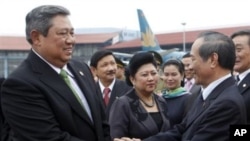Asian and world leaders are meeting in Hanoi this week for the Association of Southeast Asian Nations and East Asia summits. The annual meetings will focus on regional cooperation and economic integration but are also expected to raise concerns about China's assertiveness over maritime claims and Burma's controversial elections.
Trade and economic cooperation at the top of the agenda when the leaders of the Association of Southeast Asian Nations meet in Vietnam (Oct. 28-30).
ASEAN's 10 members - Brunei, Burma, Cambodia, Indonesia, Laos, Malaysia, the Philippines, Singapore, Thailand, and Vietnam - aim to establish a European Union-like community by 2015. The plan is to include mechanisms to improve economic cooperation and work together on issues ranging from defense and transnational crime to energy, the environment, and poverty.
The ASEAN leaders also will meet with heads of state from dialogue partners Australia, China, India, Japan, New Zealand and South Korea for the East Asia Summit.
Russia and the United States are observers to that gathering and have been invited to join in 2011.
Carl Thayer, a professor of politics at the Australian Defense Force Academy, says Beijing is not happy about renewed U.S. engagement in the region, which is seen as a counterbalance to China's influence.
"In the past China has stressed the ASEAN plus three," he said. "But, now that the U.S. has joined the East Asia Summit it's no longer in the shadow, it's center stage."
Chinese officials reacted harshly after U.S. Secretary of State Hillary Clinton at July ASEAN meetings said freedom of navigation in the South China Sea was a U.S. national interest.
Beijing claims the entire South China Sea, putting it in conflict over the Paracel and Spratly islands with Brunei, Malaysia, the Philippines, Taiwan and Vietnam.
The islands are believed to hold vast reserves of oil and natural gas and sit near critical sea lanes.
Trade between China and ASEAN has surged 50 percent this year after a free trade agreement went into effect in January.
Despite growing economic ties, Mark Beeson, a professor of politics and international relations at the University of Western Australia, says China's aggressiveness is creating tension.
"Some of the smaller nations of Southeast Asia, certainly in material and strategic terms, are concerned about the rise of China because they feel somewhat threatened," he said. "And, I think recent events, particularly with the interaction with Japan and China's behavior in the South China Seas, I think this has created a good deal of nervousness around the region and this is going to be a big focus of discussion in the forthcoming talks in Vietnam."
Trade executives say China has curtailed exports critical minerals to Japan after Japanese patrol boats in September detained a Chinese fishing vessel near a disputed island chain.
And the Chinese navy routinely detains Vietnamese fishing boats in the South China Sea, raising concerns that it intends to assert its territorial claims using both economic and military force.
Also at the Hanoi meetings, concerns are expected to be raised about Burma's elections on November 7.
Burma's military government says the elections are part of its transition to democracy after half a century of military rule.
But the military is guaranteed a quarter of all seats in parliament, has sidelined opposition parties, and has refused the vote to millions of ethnic minorities.
Thayer says ASEAN is not likely to criticize the elections in Burma, also known as Myanmar. He says ASEAN, which groups vibrant democracies like Indonesia with an absolute monarchy, two communist one-party states, and everything in between, has to balance concerns for democracy with rules that forbid interference in others internal affairs.
"So, it's a difficult one. Easy to condemn, harder to work with," he said. "But, ASEAN will ride with it because, if we look at elections in Cambodia or Laos or Vietnam, which are shams, the Myanmar elections in many respects will be slightly better than those other examples."
The United Nations Secretary-General Ban Ki-moon also will attend the meetings in Hanoi.
Ban says Burma's elections will lack legitimacy as long as democracy leader Aung San Suu Kyi is held under house arrest.
The Nobel Prize winner's National League for Democracy won Burma's last elections in 1990 but the military ignored the results and has kept her locked up most of the time since.




